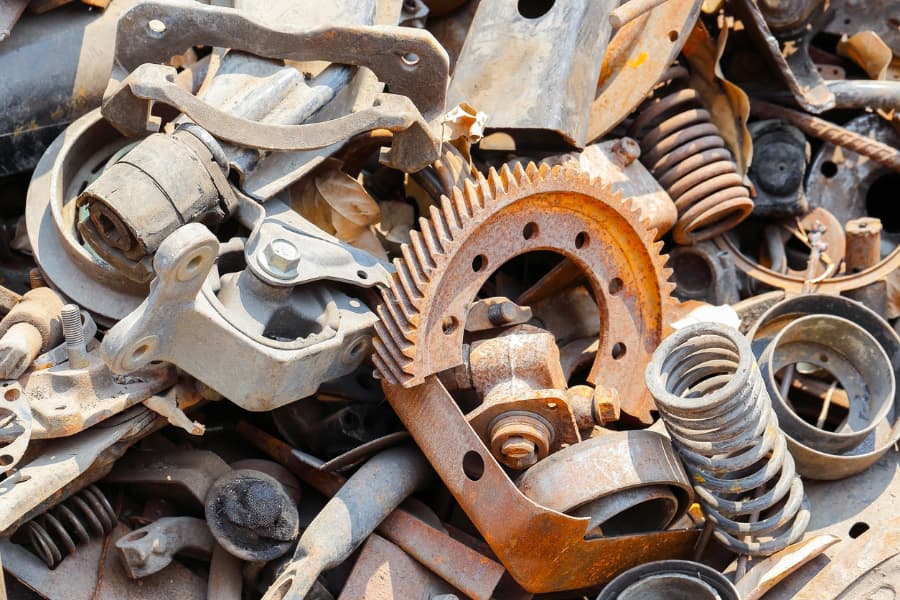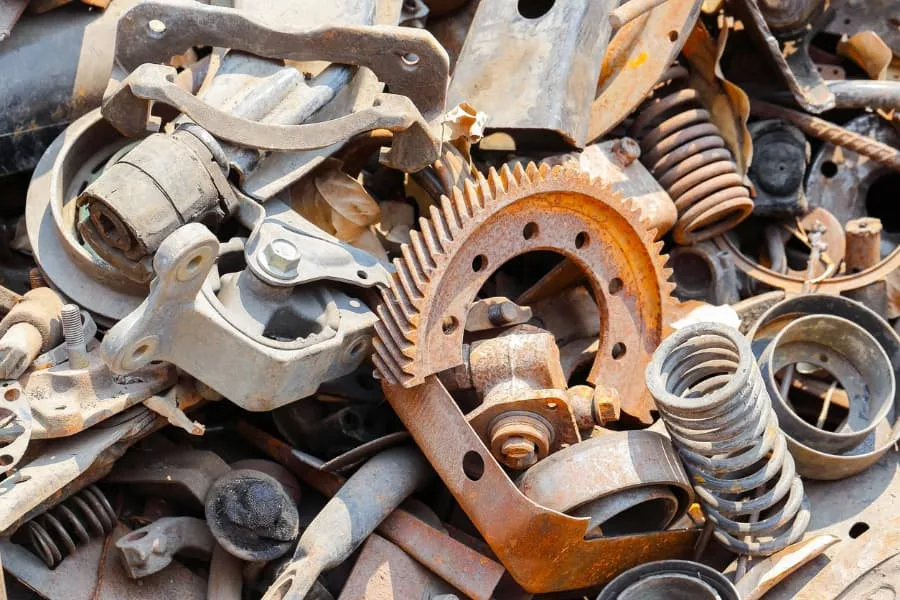
To take your scrap metal recycling efforts to the next level and make more advanced income from it, you can follow these enhanced strategies:
1. Expand Your Sources for Scrap Metal
While the basics of scrap metal collection (old appliances, aluminum cans, and electronics) are a great starting point, you can tap into more niche areas for valuable metals:
- Construction Sites: If you have access to abandoned or construction sites, you might find metal scrap like copper piping, aluminum siding, or steel beams.
- Auto Parts: Old vehicles or even junkyards often have a significant amount of scrap metal like copper radiators, aluminum rims, and steel frames.
- Industrial or Commercial Equipment: Manufacturing plants and commercial establishments may have old machinery, wires, and metal parts they want to dispose of. Getting permission to salvage these could lead to valuable finds.
2. Master Metal Sorting and Preparation
The more effort you put into cleaning and preparing your scrap metal, the higher the payout you’ll receive. Scrapyards often give better rates for clean, sorted, and prepared scrap:

- Remove Non-Metallic Components: Get rid of plastic, rubber, glass, or any other non-metallic parts that might reduce the value of your scrap.
- Scrap Type Segregation: Sort ferrous from non-ferrous metals. The non-ferrous metals like copper, brass, and aluminum are generally more valuable, so they should be treated separately.
- Clean Your Metals: The cleaner the metal, the higher the price you can command. For example, remove any dirt, grease, or insulation from copper wires.
3. Consider Bulk Selling and Partnerships
If you plan to earn more significant sums from scrap metal:
- Bulk Collections: Partner with construction companies, auto repair shops, or even local businesses to collect scrap metal in larger quantities. This allows you to sell in bulk, often at a better rate.
- Long-Term Relationships with Scrapyards: Establish a partnership with your local scrapyard. They might offer better prices for regular, bulk scrap, and you could negotiate terms based on your frequent business.
4. Stay Informed About Market Trends

The value of scrap metal fluctuates regularly based on market demand. Here’s how to stay ahead of the curve:
- Monitor Scrap Prices: Use apps like iScrap or websites that offer daily price updates for scrap metal.
- Market Research: Understand when specific metals like copper, aluminum, or brass are in high demand. For instance, if a construction boom is occurring, copper and aluminum prices may rise due to high demand.
5. Use Technology to Enhance Your Efforts
To make your recycling process more efficient and increase your profits:
- Mobile Apps for Price Tracking: Apps like iScrap not only help you locate scrapyards but also track current scrap metal prices, allowing you to sell when prices are at their highest.
- Weight and Volume Measurements: Using a portable scale or other technology to weigh your scrap metal before you visit the scrapyard can help you estimate your payout and avoid surprises.
- Digital Records: Keep track of your earnings, quantities, and sources of scrap to refine your methods and ensure you’re maximizing your profits over time.
6. Expand Into Specialized Metal Scrapping

Diversify into more niche scrap metal types that are often overlooked but highly valuable:
- Precious Metal Recovery: Old electronics, especially smartphones, computers, and televisions, contain small amounts of gold, silver, and platinum. Invest in specialized equipment to recover these precious metals.
- Scrap From Demolition Projects: As urban areas continue to evolve, demolition projects often generate significant scrap metal, including steel, copper, and even valuable items like air conditioning units (which have copper piping).
- Recycling Rare Metals: Some industries use rare metals like titanium, lithium, and palladium. These can be found in electronic devices, medical equipment, and even some automotive parts. The demand for these metals is rising, and they can be very lucrative to recycle.
7. Understand the Legalities and Environmental Impact

- Permits and Regulations: Some areas require permits or have regulations in place for scrapping metals, especially when dealing with large quantities. Make sure you’re aware of local laws.
- Eco-Friendly Practices: Consider focusing on green recycling practices, promoting your efforts as part of a sustainable effort to reduce waste and lower environmental impact. This could also open up opportunities for working with businesses or local governments that prioritize sustainability.
Expand your reach by using online platforms to sell metal items directly to consumers. Websites like Craigslist, eBay, or Facebook Marketplace allow you to sell scrap metal to those who may need it for repairs, projects, or small-scale production.
FAQs About Selling Scrap Metal for Cash
- What types of scrap metal are the most valuable?
- Non-ferrous metals such as copper, aluminum, brass, and stainless steel are generally more valuable because they don’t contain iron, which makes them less prone to rusting. Copper, especially, is one of the most lucrative metals in scrap recycling.
- Ferrous metals like steel and iron are generally worth less, but they can still bring in good money if you’re dealing with large quantities.
- Precious metals like gold, silver, and platinum can be found in old electronics and are often highly valuable.
- How do I sort my scrap metal?
- Separate ferrous and non-ferrous metals: Ferrous metals contain iron, while non-ferrous metals do not. Non-ferrous metals (like copper and aluminum) are more valuable.
- Clean the metals: Remove any dirt, grease, or insulation (especially from copper wires). Clean metals are valued higher.
- Remove non-metallic parts: Eliminate plastic, rubber, glass, and other non-metallic materials to ensure you get a better price.
- How can I increase the value of my scrap metal?
- Clean and prepare the metal: Scrapyards offer better rates for clean, sorted metal.
- Sort metals: Separate valuable metals like copper, aluminum, and brass from others like steel or iron.
- Focus on high-demand metals: Metals like copper, aluminum, and brass are often in higher demand, especially during specific market booms.
- Where can I find scrap metal to sell?
- Construction sites: Old construction materials, such as steel beams, aluminum siding, and copper piping, can be a great source.
- Auto parts: Junkyards and old vehicles often contain valuable metals like copper radiators, aluminum rims, and steel frames.
- Commercial equipment: Manufacturing plants and businesses often dispose of old machinery, which might contain valuable metals.
- Demolition projects: Urban demolition projects often provide a wealth of scrap metal, including steel, copper, and brass.
- How do I track scrap metal prices?
- Mobile apps: Apps like iScrap provide real-time updates on scrap metal prices, helping you sell when prices are at their peak.
- Market research: Understand which metals are in demand. For instance, during a construction boom, copper and aluminum may increase in price.
- Can I sell scrap metal online?
- Yes! Platforms like Craigslist, Facebook Marketplace, and eBay allow you to sell scrap metal directly to consumers or small businesses that need it for projects or repairs. This can sometimes yield better prices than traditional scrapyards.
- What do I need to know about scrap metal laws and regulations?
- Permits and regulations: Some areas have rules or require permits for scrap metal collection, especially if you’re dealing with large quantities.
- Local laws: Research the local laws around scrap metal recycling in your area, as they can vary widely.
- Eco-friendly practices: Many businesses and individuals are interested in sustainable scrap metal recycling, which can also be a selling point for you if you market your efforts as environmentally friendly.
- What are the best ways to sell scrap metal in bulk?
- Bulk selling: Partnering with construction companies, auto repair shops, and local businesses can help you accumulate large amounts of scrap metal. This allows you to negotiate better prices for bulk scrap.
- Long-term partnerships: Building relationships with scrapyards or commercial companies could lead to regular sales and potentially higher payouts.
- Is there a particular time when scrap metal prices are higher?
- Yes, prices fluctuate based on supply and demand. Typically, prices for metals like copper may rise during periods of high construction activity or technological innovation (when demand for materials like copper and aluminum spikes).
- Monitor market trends: Regularly check prices using apps or websites that provide daily updates for scrap metal.
- Are there any eco-friendly benefits to selling scrap metal?
- Environmental impact: By recycling scrap metal, you’re contributing to reducing waste, conserving natural resources, and lowering environmental pollution.
- Sustainability: Promoting scrap metal recycling as an eco-friendly practice can be a way to attract businesses or customers who prioritize sustainability.
Conclusion
Selling scrap metal can be a profitable and rewarding venture if you know where to find valuable materials, how to prepare them for sale, and how to track market trends. By diversifying your sources, focusing on valuable metals, and staying informed, you can turn scrap metal recycling into a lucrative side hustle or full-time business. Additionally, following legal guidelines and promoting sustainable practices will allow you to work within the framework of local regulations while contributing positively to the environment.

